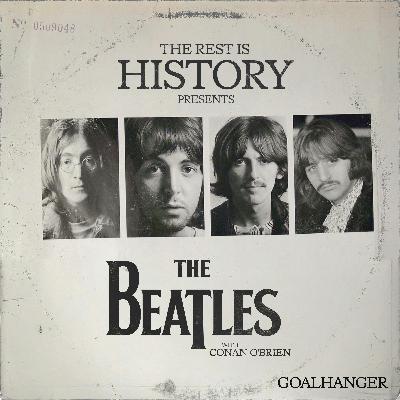
The Rest Is History
Author: Goalhanger
Subscribed: 331,894Played: 10,998,254Description
Take a deep dive into History’s biggest moments with Tom Holland & Dominic Sandbrook.
Explore the stories of History’s most brutal rulers, deadly battles, and world-changing events. From the rise and fall of the Roman Empire, the Nazi conquest of Europe, and Hitler’s evil master plan for world domination, to the French Revolution, the sinking of the Titanic, or the Norman Conquest of England in 1066, Tom and Dominic bring the past to life with gripping storytelling and expert analysis, as they unpack the high-drama moments that shaped our world.
Join The Rest Is History Club: Unlock the full experience of the show – with exclusive bonus episodes, ad-free listening, early access to every series and live show tickets, a members-only newsletter, discounted books from the show, and access to our private Discord chatroom. Sign up directly at therestishistory.com.
For more Goalhanger Podcasts, head to www.goalhanger.com.











I didn't understand, who was jack
lovely
Utilisez ce code promo melbet 2026 lors de votre inscription pour obtenir un bonus sportif de 100 % jusqu’à 130 € (ou 130 $). Rejoignez Melbet et récupérez votre bonus de bienvenue grâce aux derniers codes promo Melbet. Inscrivez-vous sur Melbet, choisissez votre bonus préféré (sport ou casino), saisissez le code promo WAP200 et c’est parti ! https://fcdoazit.org/img/pgs/?le-code-promo-Melbet.html
1xBe, MelBet Best Welcome ofrece una amplia variedad de mercados, cuotas y juegos para apostar. Los como poner Codigo promocional en MelBet Best son justos y fáciles de usar, lo que te permite aumentar tus apuestas. Sin embargo, ten en cuenta que la verificación de identidad puede ser un poco lenta al apostar grandes cantidades. Una vez completado este paso, no tendrás de qué preocuparte. ¡Disfruta de tus apuestas con nuestro código de apuesta gratis MelBet TOP100!https://iptel.com.ar/wp-content/pgs/codigo_promocional_melbet_reciba_100_euros.html
.
I LOVE Conan on this. He and Tom are great together.
It's interesting that french talent is mentioned, but the French precursor to the internet isn't mentioned.
Why "canary in the gas chamber", and not "canary in the coal mine"? Strange...
While I enjoyed the episode about the history of Disneyland, I feel you did a major disservice to the town of Jim Thorpe, the person, and the complicated history of how they are intertwined. It is astounding to me that a show about history failed to do so, and then proceeds to mock them. Jim Thorpe was an amazing Native American athlete and deserves far more respect than you gave him. the town that would become Jim Thorpe, Mauch Chunk, likewise deserves better than to be scoffed at. Do better.
why love ya podcasts
great agree with you https://fonemiportal.com.mx/
Great job! Now I don't have to go through watching it all, what a relief :)
Boys never grow up, they just grow old.
He was more than a prophet, he was philanthropist, economist, leader and revolutionary person world has ever seen.
I couldn't take an interest in a podcast about rich, elderly men sexually abusing a teenager.
The Norman Conquest can surely be compared with the Nazi occupation of France, Belgium, Holland and Poland. Our aristocracy today is basically Norman ... the same families still occupy the top few per cent. Northumberland, Westminster etc at all. The conquest should be a lesson to our political leaders that if we fail to defend our country we could lose it ... and that would be most unpleasant.
The story of Zeus has always been fascinating — defeating Cronos, freeing his siblings, winning the Titanomachy, and finally becoming king of Olympus. ⚡ That same mythical energy comes alive in the new Subway Surfers Greece update. https://thesubwaysurfers.com/ Valentina’s divine upgrade and Sunny’s radiant debut feel just like heroes stepping onto the stage in those ancient myths. Even the 8 Ball crossover, with tokens to collect across 6 cities, feels like a modern version of a hero’s quest — just like the journeys Greek heroes once took, filled with trials and triumphs. The myths and the game are different worlds, but they share the same spirit: legends never die, they just return in new styles and colors.
wao
that Putin call aged badly 😬
o57ii